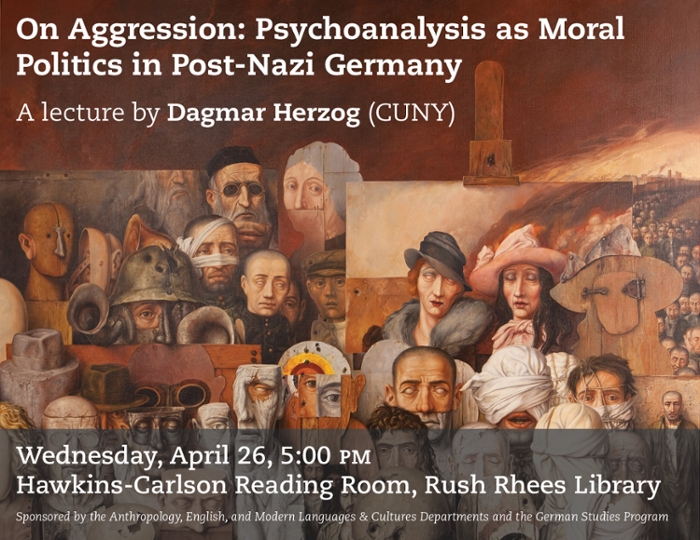News & Events
Dagmar Herzog (CUNY) Lecture: "On Aggression: Psychoanalysis as Moral Politics in Post-Nazi Germany"
April 26, 2017
05:00 PM - 06:30 PM
Hawkins-Carlson Room, Rush Rhees Library, River Campus

The heyday of intellectual and popular preoccupation with psychoanalysis in the West reached from the 1940s to the 1970s, from post-Nazism through Cold War consumerism to the anti-Vietnam War movement and the sexual revolution. In each country the ensuing debates over the truth about how human beings are took unique form. Only in West Germany did debates about the value of psychoanalysis as a system of thought circle so intensely around the question of whether or not aggression was an ineradicable aspect of the human animal and whether or not it might best be conceived as a "drive" comparable in strength and form to libido. This lecture analyzes the wholly unexpected consequences set in motion by the publication of ethologist Konrad Lorenz's On Aggression, not only on the oeuvre of the preeminent West German psychoanalyst Alexander Mitscherlich, but also on the eventual shape taken by the New Left's politics and theories of human nature. The talk discusses how difficult it was to return psychoanalysis to a country in which antisemitism was still strong. It also discusses how dramatically the West German sexual revolution changed the terms of debate about the relationships between aggression and libido.
Dagmar Herzog is Distinguished Professor of History and Daniel Rose Faculty Scholar at the Graduate Center, City University of New York. She has published extensively on the history of religion, the history of the Holocaust and its aftermath, and the histories of gender and sexuality. Among her books are Sex after Fascism: Memory and Morality in Twentieth-Century Germany (2005) and Sexuality in Europe: A Twentieth-Century History (2011). She has just published a transatlantic history of psychoanalysis in the postwar era, with particular attention to the themes of desire, trauma, and aggression, entitled Cold War Freud: Psychoanalysis in an Age of Catastrophes, and is preparing a new project on eugenics, disability, and reproductive self-determination in twentieth-century Europe.
Light refreshments will be served.
Sponsored by the Anthropology, English, and Modern Languages & Cultures Departments and the German Studies Program.
Links:
Category: Lectures